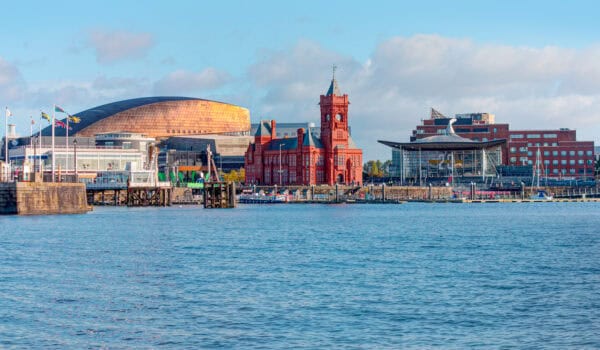Madchester? A sketch from the Conservative Party Conference
I used to get nostalgic attending Conservative Conferences in Manchester. Being shouted at by far-left protestors reminded me of my time as a right-of-centre student union hack in the early 1990s.
Just like the early 2020s, the early 1990s was a period when an unpopular Conservative administration was limping towards the end of its time in office. Trying to persuade other Manchester-based students to veer right rather than left was a challenge that guaranteed abuse. In one instance, someone kicked away one of my crutches (after I broke my ankle trying to high jump…). That still seems an odd way to convince me of the superiority of their views. There were lighter moments too, as when a fresher muddled up the Conservation Society with the Conservative Association. There are only so many times ‘Do you go out in the field?’ can be answered with ‘We help out at local by-elections.’
This year, however, any abuse of passers-by was reserved for Labour’s Liverpool shindig, where a motley and shouty selection of anti-ID card, anti-abortion and anti-Israel protestors were in need of a Strepsil or two. Depressingly, I heard one protestor shout at a conference delegate who supported ID cards, ‘I bet you went to university.’ Even Steve Bray gave the Tories a miss this year, though his portable speakers were blasting away in Liverpool. (A friend suggested we should ask him where his extremely loud portable sound system came from … ‘Steve Bray as sponsored by Richer Sounds’?)
If there was nostalgia to be had at the Conservative Conference, it was for the 1970s. There were multiple screenings of Margaret v Ted – An inconceivable victory, in which Michael Portillo narrated the story of Thatcher’s victory in the Conservative leadership election of 1975. There were various fringe meetings on ‘why nothing works’ that also recalled the 70s, especially when held in the shadow of the old Free Trade Hall, where 49 years ago the Sex Pistols played their most famous gig (though Anarchy in the U.K. had yet to join the setlist). The problem for the Tories is that change takes time, so the state of public services in 2025 has more to do with past Conservative Governments than the Labour one elected in 2024 – and everyone knows it.
HEPI is non-partisan, always keen to publish views from across the political spectrum. That’s why we attended both the Conservative and Labour Conferences and why we are weighing up whether to go to Reform’s Conference next year. But I started this blog with shouty abuse because it links to the theme of HEPI’s fringe event held in conjunction with the University of Sussex, the University of Manchester and Goldsmiths, University of London: ‘How can universities best win back public support’.
Our speakers had different answers to this important question.
- Neil O’Brien MP, the Shadow Minister for Policy Renewal and Development, ascribed the lukewarm approach towards universities to the (arguably) high number of low-quality degrees as well as to the lack of incentives on universities to prioritise economic growth.
- Professor Sasha Roseneil from the University of Sussex (Kemi Badenoch’s alma mater) pointed the finger at endless negative media coverage, which she said was out of kilter with what the public really think about universities.
- Professor Annabel Kiernan from Goldsmiths shifted the tone by reminding us about the many positives – not all financial – of a broad education, which Professor Duncan Ivison from the University of Manchester echoed before warning of the need to stop universities falling into the hole that already contains all those other areas of life that the electorate have deemed to be failing.
- Finally, Alex Stanley of the NUS put students centre stage along with all the challenges they are currently facing. Anyone who thinks the NUS is still obsessed with the issues outside the mainstream of students’ concerns should listen to Alex’s wise words, which are always persuasively put.
There weren’t half as many events on higher education in Manchester as there were the previous week in Liverpool. But one other organisation that made the effort was the King’s College Policy Institute, which hosted a panel on ‘What is the Conservative approach to higher education and skills integration?’ in which I took part.
It wasn’t entirely clear if the title was referring to the Conservatives’ past, present or future policies but, for my take, I pointed out their early years in office after 2010 included a well-defined set of policies built around:
- increasing the unit of resource for teaching (via higher tuition fees and loans) and protecting research spending even in the depth of austerity;
- giving more power to students and institutions through the removal of student number caps; and
- placing a renewed focus on teaching quality and student outcomes.
(As readers may know, I worked on these areas before joining HEPI in 2014, so declare an interest in them.)
I went on to note the biggest problems facing our system of post-compulsory learning are not actually in higher education. The OECD’s recent Education at a Glance, which HEPI helped to launch, showed we have a high participation rate, a low drop-out rate and excellent graduate outcomes (on average), whether we are talking about employment, wages or health. But it also showed terrible (average / relative) outcomes for those who leave school with only GCSEs or equivalent.
I ended my remarks by pleading with the Conservative Party to strive towards a ‘three Bs strategy’. By this, I meant focusing on the half of the population doing much worse educationally: Boys. For every 54 young women that make it to higher education, only 40 young men do so. Yet Minister after Minister and Government after Government have failed to adopt a dedicated focus on the scandal of male underachievement.
I also suggested a future Conservative Government should focus on Bilingualism or at least inculcating a Bare familiarity with a language other than English. Language learning has declined catastrophically since a second language stopped being compulsory at Key Stage 4 (GCSE-level) around 20 years ago. The idea then was that primary school language learning would be bolstered and lots of secondary school pupils would voluntarily enrol for a language GCSE or two. But it has not worked out like that: there are now more A-Levels taken in PE than in French, German and Classical Languages combined. It seems ironic that a factor nudging people towards Brexit was one of Tony Blair’s education policies.
My third B is ‘BTECs’ and similar, which the last Conservative Government and the current Labour one have been trying to kill slowly. Yet T-Levels and A-Levels are not right for everyone and much of the recent progress in widening participation in higher education has been among BTEC students.
So most people who have considered the question, including Professor Becky Francis (who is overseeing the Curriculum and Assessment Review), agrees there should be a third way. Last week’s Labour Conference has left people expecting a brand new vocational qualification alongside As and Ts, producing a policy already confusingly labelled V-A-T (as if VAT were popular …). But the floor is littered with politicians’ attempts to design new vocational qualifications (GNVQs, diplomas etc). This approach is far from guaranteed to succeed: indeed, unless the errors of the past are meticulously avoided, the new approach will be more likely to fail than to succeed.
That surely gives His Majesty’s Official Opposition a duty to scrutinise the current Government’s approach and provides a possible opportunity for them to rebuild a reputation for being knowledgable, moderate and competent. Yet as I file this piece, news is coming in that the Leader of the Opposition will instead opt to focus her main Conference speech on Wednesday on kicking universities and promising to slash the number of university places. This will be accompanied by a promise of more apprenticeships … but they said that in government yet presided over a reduction.
It is almost as if someone believes saying, ‘Vote Conservative and we will stop your child(ren) from going to university’ could be a vote winner.







Comments
David Palfreyman says:
Final para very telling. Reminds me of the excellent book by the Cambridge historian (whose name I forget! – sorry) which explains the post-1945 growth of education (going into the 1950s expanded 6th Forms; then going into the 1960s expanding HE; next ‘Going to Uni’ even more so as HE massified in the 90s) as being based on parental expectations. And so, as Nick says, which politicians dare deny such expectations? Unless, of course, they really can provide an attractive alternative to Uni that becomes a viable parental expectation? – apprenticeships are not to be just for other peoples’ children?
Reply
Chris Husbands says:
It’s Peter Mandler, The Crisis of the Meritocracy. Excellent book.
Reply
Jonathan Alltimes says:
What is skills integration?
I agree, after 81 years of public education, the state still can not provide consistent high quality secondary education. The push to raise standards in secondary during Thatcher and Josef did not work. The push to raise standards in primary schools under Blair did not work. The state could not provide the standard of (academic) education to meet the expectations of post-war parents and after, for the same quality as privately educated pupils. Who can say what parents wanted, other than peace for their children?
The push to raise standards in higher education under Cameron and May did not work. Comparisons with other countries using crude metrics are misleading, as they have different systems of education. Are you comparing like with like? The function of teaching is to fashion identities ready for employment, of which skills are an expression. The three policies were well-defined, but lacked sensitivity towards the transmission processes in that higher education was not a bureacratic enterprise, but has become so in order to respond to the incentive policies and in the process is no longer higher education. More money in has not caused more money out in the form of net efficiencies, higher wages, and more taxes from economic growth.
A proportion of children are not interested in academic subjects. A strong focus on foreign languages is not going to be restored, as there is now no strong rationale, as we have left the EU and its post-war legacy (what remains should focus on speaking). Why are they trying to kill BTECs? The reason why apprenticeships have not worked is we advocated a labour market for skills and no mandatory training, while the scale of manufacturing and other technical sectors dwindled. What other choice is there as an old gold standard, other than university?
Education bears the weight of trying to do too many things at the behest of the ambitions of political parties.
Reply
Add comment